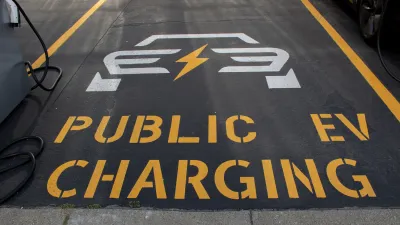I was reading Wendell Cox's recent attack on the Center for Neighborhood Technology's affordability calculations, and was struck by one thing he wrote:“transportation costs will be reduced in the future by the far more fuel efficient vehicles being required by Washington.”* In other words, don't worry about Americans being impoverished by the cost of a car for every man, woman, and 16-year old in the House: the technological miracle of fuel efficiency will save us.
I was reading Wendell Cox's recent attack on the Center for Neighborhood Technology's affordability calculations, and was struck by one thing he wrote:"transportation costs will be reduced in the future by the
far more fuel efficient vehicles being required by Washington."*
In other words, don't worry about Americans being impoverished by the cost of a car for every man, woman, and 16-year old in the House: the technological miracle of fuel efficiency will save us.
Now, this argument has a grain of truth: new EPA regulations will require the average vehicle to get 35 miles per gallon by 2016**, so cars will become somewhat more fuel efficient if next year's Republican Congress or the federal courts don't get in the way. But even so, the benefits of fuel efficiency may be canceled out by gasoline price rises - and even if they don't, gasoline costs comprise only about 30 percent of vehicle-related expenses. In 2007 the average household spent $2384 on gasoline and motor oil, $3244 on car purchases, and $2592 on other vehicle-related expenses.***
I have seen the same argument raised to deflate concerns about automobile-related air pollution or greenhouse gas emissions: even if pollution is a problem today, tomorrow's Wonder Cars of the Future will drive the problem away. For example, one blog writes: "The widespread availability of electric cars will make one argument made
by transit proponents harder to advance: that riding trains and buses
is better for the environment."*****
But it is not just the defenders of the sprawl status quo who rely on hoped-for technological change to support their views.
Critics of sprawl often argue that sprawl is doomed because of Peak Oil. According to this argument, supplies of oil will become unreliable, and the Peak Oil Fairy will slay the dragons of unsustainable development. One recently published book summarizes the theory: "Why Your World Is About To Get A Whole Lot Smaller."
To be fair, one or both of these arguments could be true. It is possible that 100 mile-per-gallon cars will revolutionize American transportion. It is also possible that scarce or expensive gasoline could revolutionize American transportation.
But maybe not -and it seems to me that a technological change that hasn't happened yet isn't a particularly strong argument for any public policy.
*http://www.newgeography.com/content/001526-the-muddled-cnt-housing-and-… .
**http://www.fastcompany.com/1604219/obama-sets-new-fuel-efficiency-stand…
*** http://www.census.gov/compendia/statab/2010/tables/10s0668.pdf
****http://www.thetransportpolitic.com/2010/03/31/whos-afraid-of-the-electr…

Maui's Vacation Rental Debate Turns Ugly
Verbal attacks, misinformation campaigns and fistfights plague a high-stakes debate to convert thousands of vacation rentals into long-term housing.

Planetizen Federal Action Tracker
A weekly monitor of how Trump’s orders and actions are impacting planners and planning in America.

San Francisco Suspends Traffic Calming Amidst Record Deaths
Citing “a challenging fiscal landscape,” the city will cease the program on the heels of 42 traffic deaths, including 24 pedestrians.

Defunct Pittsburgh Power Plant to Become Residential Tower
A decommissioned steam heat plant will be redeveloped into almost 100 affordable housing units.

Trump Prompts Restructuring of Transportation Research Board in “Unprecedented Overreach”
The TRB has eliminated more than half of its committees including those focused on climate, equity, and cities.

Amtrak Rolls Out New Orleans to Alabama “Mardi Gras” Train
The new service will operate morning and evening departures between Mobile and New Orleans.
Urban Design for Planners 1: Software Tools
This six-course series explores essential urban design concepts using open source software and equips planners with the tools they need to participate fully in the urban design process.
Planning for Universal Design
Learn the tools for implementing Universal Design in planning regulations.
Heyer Gruel & Associates PA
JM Goldson LLC
Custer County Colorado
City of Camden Redevelopment Agency
City of Astoria
Transportation Research & Education Center (TREC) at Portland State University
Jefferson Parish Government
Camden Redevelopment Agency
City of Claremont






























